
News & Stories
Paris. New excitement in France: UEFA Events SA, organizer of the EURO 2016, which will be hosted by 10 cities in France this summer, has chosen HomeAway as a national sponsor and as the official fan accommodation service. Unions protest as HomeAway is obviously not forced to collect taxes as opposed to hotels.
Frankfurt/M. The German event market will continue to grow – although the pace of growth has clearly slowed down. Moreover, against the backdrop of the recent social developments experts expect rather moderate future growth while budgets will grow significantly faster. The German meetings industry is still growing with a total of 393 million participants attending events held in the country last year – an increase of 2.6% from the previous year. Germany's popularity as a meeting and events destination is increasing, particularly on an international level. The number of international visitors rose significantly last year by 8.3% to 27.7 million and the number of international visitors travelling to events has almost doubled in ten years. These are the results of the "Meeting- & EventBarometer 2016".
Vienna. After the February figures were revealed, several institutions slammed on the brakes regarding Austria's winter tourism. Last but not least due to the VAT increase to 13 percent on May 1.
Paris. With more than 84 million foreign visitors, France managed to remain the first destination in the world in 2015. Despite last November's tragic terrorist attacks which killed over 130 people and injured dozens, the country still holds the much disputed title that China, the US and Spain are also going after.
Brussels. Last month, Brussels was hit by a double terrorist attack which killed 35 people and injured over a hundred. Already impacted after the attacks in Paris last November, which were linked to terrorist networks in Belgium, the country is suffering even more today.
Berlin. ITB Berlin celebrated its 50th jubilee fully booked exhibition halls, more trade visitors than ever before, and record sales. Furthermore, the trade fair announced its debut into China in May 2017. In addition to ITB Asia in Singapore, ITB China will take place in Shanghai.
Berlin. The mood among investors and hotel operators remains good to euphoric, even if the sharing economy, the fear of Brexit and the troubles faced by the Chinese economy cast a small shadow. This was illustrated by numerous conversations, speeches and impressions at this year's International Hotel Investment Forum in Berlin.
Frankfurt. Business travellers will likely be travelling increasingly by train instead of by plane. In addition, economy and budget hotels are experiencing rising booking numbers. Furthermore, there are increasing discussions on safety.
Milan. A study proves: Italy still has unexplored potential in the midscale and economy segments, as well as in some non-core destinations. New brands may adapt conversions of particular buildings and should be willing to consider variable lease contracts as an acceptable compromise to management contracts. The latter are not very popular in Italy. Nevertheless, the penetration rate of chain hotels in the Italian market has grown from 4.1 percent of the total room supply in 2003 to 13.6 percent in 2015. All in all, the study is proof of the regeneration process of the Italian hospitality system.
Rockville. Choice launched "Vacation Rentals by Choice Hotels" this week. In the US, the hospitality group becomes the first hotel brand to partner with local vacation rental management companies. It sells the confidence and transparency of its brand to leisure travelers seeking privacy.


